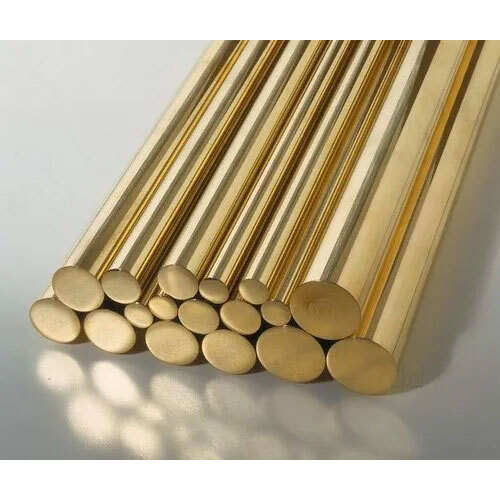Specification
- सतह का उपचार
- प्रॉडक्ट टाइप
- शेप
- कठोरता
- Hard
- ग्रेड
- Industrial
- रंग
- Golden
Trade Information
- Minimum Order Quantity
- 100 Kilograms
- आपूर्ति की क्षमता
- प्रति महीने
- डिलीवरी का समय
- दिन
About
The Phosphor Bronze Rod is an incredibly robust and durable alloy made of copper, tin, and phosphorus, and has great strength, toughness, and corrosion resistance. This rod does not wear well, but it has good fatigue resistance, and it can perform in high wear applications such as electrical, mechanical, and marine environments. Phosphor bronze is extremely machinable and pliable, with some properties of steel springs, and is used to make: bushings, bearings, gears, springs, precision parts, fasteners, etc. The addition of phosphorus improves stiffness and wear properties at higher temperatures, providing strength and dependability under extremely harsh conditions. The anti-corrosive properties and conductivity of phosphor bronze make it an excellent choice for industrial and engineering projects providing good performance and durability.
Chemical Composition :
| Grade 1 | Grade 2 | Grade 3 | Grade 4 | |||||
| Elements | Min.% | Max.% | Min.% | Max.% | Min.% | Max.% | Min.% | Max.% |
| Tin | 6.0 | 8.0 | 10.0 | 6.5 | 8.5 | 9.0 | 11.0 | |
| Phosphorus | 0.3 | 0.5 | 0.5 | 0.3 | 0.15 | |||
| Lead | - | 0.25 | - | 0.25 | 2 | 5 | - | 0.25 |
| Zinc | - | 0.5 | - | 0.05 | - | 2 | - | 0.05 |
| Silicon | - | 0.02 | - | 0.02 | - | - | - | - |
| Iron | - | 0.3 | - | 0.1 | - | - | - | - |
| Aluminium | - | 0.01 | - | 0.01 | - | - | - | - |
| Antimony | - | 0.1 | - | - | - | - | - | - |
| Nickel | - | 0.7 | - | 0.1 | - | 1 | - | 0.25 |
| Total Impurities | - | 1.2 | - | 0.6 | - | 0.5 | - | 0.8 |
| Copper | Remainder | Remainder | Remainder | Remainder | ||||
FAQs of Phosphor Bronze Rods:
1. How is phosphor bronze rod beneficial in engineering applications?
Components made from phosphor bronze rod are well known for good performance, strength, ductility, wear-resistance, and corrosion-resistance. The properties combined make an excellent material for heavy-duty components that require strength, reliability, and long service life under continuous mechanical stress.
2. Why is phosphor bronze rod preferred for electrical components?
Great conductivity, low sparking characteristics, and corrosion protection allow phosphor bronze rods to be used as electrical connectors, switches, and terminals. They will perform well for many years under good conditions and will maintain their performance under harsh environmental exposure for many years without yields, faults, shorts, or excessive drop in efficiency.
3. In which industries is phosphor bronze rod commonly used?
Phosphor bronze rod is used extensively in the marine, automotive, aerospace, and industrial engineering industries. While it is not widely used in electrical equipment and precision instruments, its combination of strength, corrosion resistance, and machinability makes it an excellent performing material and a reliable option for long-term performance in a wide variety of applications.
4. How does phosphorus improve the properties of the alloy?
Adding phosphorus can increase the hardness, stiffness, and wear resistance of bronze, as well as increase fatigue resistance. Together, it also improves machinability and gives the alloy sufficient balance to hold its shape or function in a hostile environment, making the alloy reliable for high-performance usage.
5. What makes phosphor bronze rod suitable for marine environments?
Phosphor bronze rod is naturally resistant to corrosion and wear due to exposure to seawater or humidity. In marine applications, its anti-friction properties and robustness allow it to perform well in marine fittings, pumps, and shipbuilding applications, giving it reliability even under full exposure to harsh marine environments.

Tell us about your requirement

Price: Â
Quantity
Select Unit
- 50
- 100
- 200
- 250
- 500
- 1000+
Additional detail
मोबाइल number
Email

 English
English Spanish
Spanish French
French German
German Italian
Italian Chinese (Simplified)
Chinese (Simplified) Japanese
Japanese Korean
Korean Arabic
Arabic Portuguese
Portuguese

